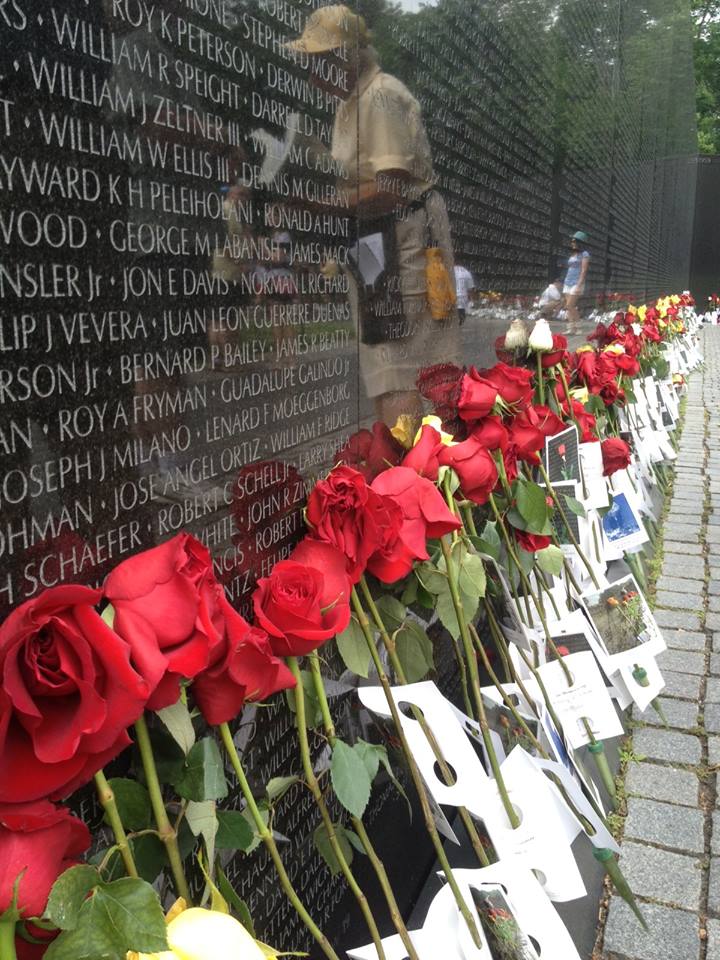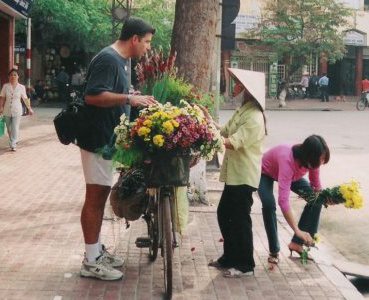
Families Gather for the Cleaning of The Wall
Stars and Stripes: A wash to honor fathers’ sacrifice
Families gather for a cleaning of the Wall
WASHINGTON — For years, Patty Lee didn’t speak about her father; her mother never discussed him with her six children.
But Sgt. 1st Class Delbert C. Totty hadn’t done anything wrong. The unspoken truth was that he was killed in action in Vietnam when Lee was 12 years old.
“We all grew up in silence,” Lee said of a generation of children whose fathers died in a war many wanted to forget. “We didn’t talk about Vietnam, we didn’t talk about our fathers.”
It’s difficult to fathom in this age of solemn homages to troops killed in Iraq and Afghanistan and warm welcomes when they come home safely, but for the children of Vietnam veterans, the fate of their fathers was often a dark secret.
Lee, now 60, didn’t have a chance to grieve for 25 years until 1992, when a new group, Sons and Daughters in Touch, organized a gathering at the Vietnam Memorial in Washington, D.C., for children of troops lost in the war. For many like Lee it was the first time they met others with similar stories — the first time they didn’t feel alone.
The 1992 gathering sparked what became a regular Father’s Day weekend tradition for survivors, many of whom didn’t find their voice until they had outlived their fathers, long after the war was over.
On Saturday, more than two decades after that initial meeting, in the murky light of a cloudy early morning, the polished granite of the memorial wall reflected the images of more than 100 people — some using walkers, others still with braces on their teeth, many carrying brushes and buckets of soapy water. Pointing to one of the 58,000 names on the wall, they recalled a loved one.
It was the beginning of a weekendlong event organized by Sons and Daughters in Touch and the Vietnam Veterans Memorial Fund for survivors to coincide with Father’s Day. There will be a public ceremony at the memorial on Sunday beginning at 10 a.m.
All these years later, meeting at the wall is still an emotional event even for regular attendees.
“It’s very personal,” Lee said, choking up as she prepared to wash the wall Saturday.
Now, the children of the fallen bring their own children to wash the wall together. It is about much more than lending a hand to the National Park Service. It is a symbolic gesture that for many is the only chance they had to do something for their father.
“This is more about the catharsis,” said Sons and Daughters In Touch co-founder Tony Cordero, whose father, Air Force Maj. William E. Cordero, was killed in Vietnam.
Colleen Shine washed the wall with her son, Matthew Luepke, 10, and her daughter, Chiara Luepke, 12. They were washing the panel that bore the name of Shine’s father, Lt. Col. Anthony C. Shine. Growing up, she experienced the additional pain of missing her father and not knowing his fate. He was considered missing in action for 24 years after his plane went down near the Vietnam-Laos border in 1972.
After navigating the Communist country’s bureaucracy and a journey deep into the countryside near the Laos border, she found a villager who had a helmet that matched the description of the helmet her father was supposed to have worn on his final flight. When she turned it over, she saw his name handwritten on the inside.
For Shine, 50, the most important part of the wall washing is the lessons for her children, who never got to meet their grandfather.
“What it’s about is teaching them the issues of war so we’ll not have to repeat them,” Shine said. “Seeing my children clean the wall and seeing our reflections is a reminder that we are the living legacies of that wall.”


